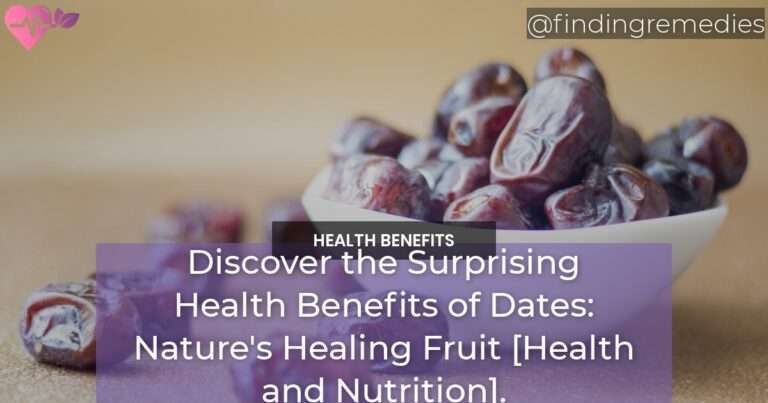Dates are a popular fruit that have been consumed for centuries for their sweet taste and nutritional benefits. They are a great natural sweetener that can be used in place of refined sugar in various recipes. But did you know that dates are also packed with nutrients that can improve your health in various ways?
In this article, we will explore the health benefits of dates, their natural compounds, and the nutritional profile they offer.
Table of Contents
Nutritional Profile of Dates
Dates are a great source of macronutrients and micronutrients, making them a healthy addition to any diet. Here’s what you need to know about their nutritional profile:
- Fiber: Dates are a good source of dietary fiber, which is essential for digestive health. One serving (about 3 dates) provides 2.4 grams of fiber.
- Sugar and calorie content: While dates are high in sugar, they are still a healthier option than refined sugar. One serving contains approximately 66 calories and 16 grams of sugar.
- Vitamins and minerals: Dates are rich in vitamins and minerals such as potassium, iron, calcium, magnesium, and phosphorus. These nutrients are essential for various bodily functions, including heart health, bone health, and immune system function.
Natural Compounds in Dates
Dates are also rich in natural compounds such as polyphenols, flavonoids, and carotenoids. These compounds offer numerous health benefits, including:
- Antioxidant properties: Polyphenols and flavonoids are powerful antioxidants that protect your cells from damage caused by free radicals.
- Anti-inflammatory effects: Carotenoids have anti-inflammatory properties that can help reduce inflammation in the body, which is linked to various chronic diseases.
Health Benefits of Consuming Dates
Now that we know about the nutritional profile and natural compounds of dates, let’s explore the many health benefits they offer:
Improved digestion and gut health
Dates are a good source of fiber, which is essential for maintaining healthy digestion. Fiber helps bulk up stool, which can prevent constipation and other digestive issues. Additionally, dates contain natural compounds that have prebiotic effects, which can promote the growth of beneficial gut bacteria.
Lowered risk of chronic diseases
Dates have been shown to have various health benefits that can lower your risk of chronic diseases such as diabetes, heart disease, and cancer. For example, dates are rich in potassium, which can help lower blood pressure and reduce the risk of heart disease. Additionally, their high antioxidant content can help protect against cancer by reducing oxidative stress and inflammation.
Increased energy levels and reduced fatigue
Dates are a great source of natural sugars, which can provide a quick boost of energy. Additionally, they contain vitamins and minerals such as iron and magnesium, which are essential for energy production and can help reduce fatigue.
Improved bone health
Dates are a good source of calcium, which is essential for bone health. Additionally, they contain other minerals such as magnesium and phosphorus, which can also help strengthen bones.
Reduced blood pressure and cholesterol levels
As mentioned earlier, dates are a good source of potassium, which can help lower blood pressure. Additionally, dates have been shown to reduce cholesterol levels in the body, which can also lower the risk of heart disease.
Effects of Cooking and Proper Storage of Dates
To get the most nutritional value out of dates, it’s important to cook and store them properly. Here are some tips:
- Store dates in an airtight container in the refrigerator to keep them fresh.
- Avoid cooking dates at high temperatures, as this can reduce their natural compounds.
- Soaking dates in water before cooking can make them easier to blend and digest.
Risks and Disadvantages of Consuming Dates
While dates offer many health benefits, there are some risks and disadvantages to be aware of:
- Potential allergic reactions: Some people may be allergic to dates, which can cause symptoms such as itching, hives, and difficulty breathing.
- High sugar content: While dates are a healthier option than refined sugar, they are still high in sugar and can affect blood sugar levels. People with diabetes should consume dates in moderation.
- Impact of overconsumption on weight gain: Dates are high in calories and can contribute to weight gain if consumed in excess.
Varieties and Types of Dates
There are many different varieties and types of dates, each with their own unique characteristics and nutritional profiles. Here are some popular types:
- Medjool dates: Large and sweet, Medjool dates are a good source of fiber and potassium.
- Deglet Noor dates: This variety is smaller and less sweet than Medjool dates, but still a good source of nutrients.
- Barhi dates: Barhi dates are soft, sweet, and often consumed fresh.
Healing and Medicinal Properties of Dates
Dates have been used for medicinal purposes for centuries. Traditional uses include using them to treat constipation, diabetes, and other ailments. Research has shown that dates offer various healing properties and may be effective in treating conditions such as:
- Anemia
- Hypertension
- Colon cancer
- Alzheimer’s disease
While more research is needed to confirm these findings, dates show promise as a natural remedy for various health conditions.
Conclusion
Dates are a delicious and nutritious food that offer numerous health benefits. They are a good source of fiber, vitamins, and minerals, and contain natural compounds that have antioxidant and anti-inflammatory effects. By incorporating dates into your diet, you can improve your digestive health, lower your risk of chronic diseases, and improve your overall well-being.
Resources
- 1. “Date fruit: chemical composition, nutritional and medicinal values, products” by Saikat Sen and Raja Chakraborty.
- 2. “Date palm (Phoenix dactylifera L.): an underutilized fruit tree with potential for worldwide food and medicinal applications” by Saleh A. Al-Qarawi et al.
- 3. “Dates and Health: A Review of the Evidence” by Rebecca Waller et al.
- 4. “A review on nutritional and medicinal properties of date palm (Phoenix dactylifera L.)” by Siti A. Husain et al.

